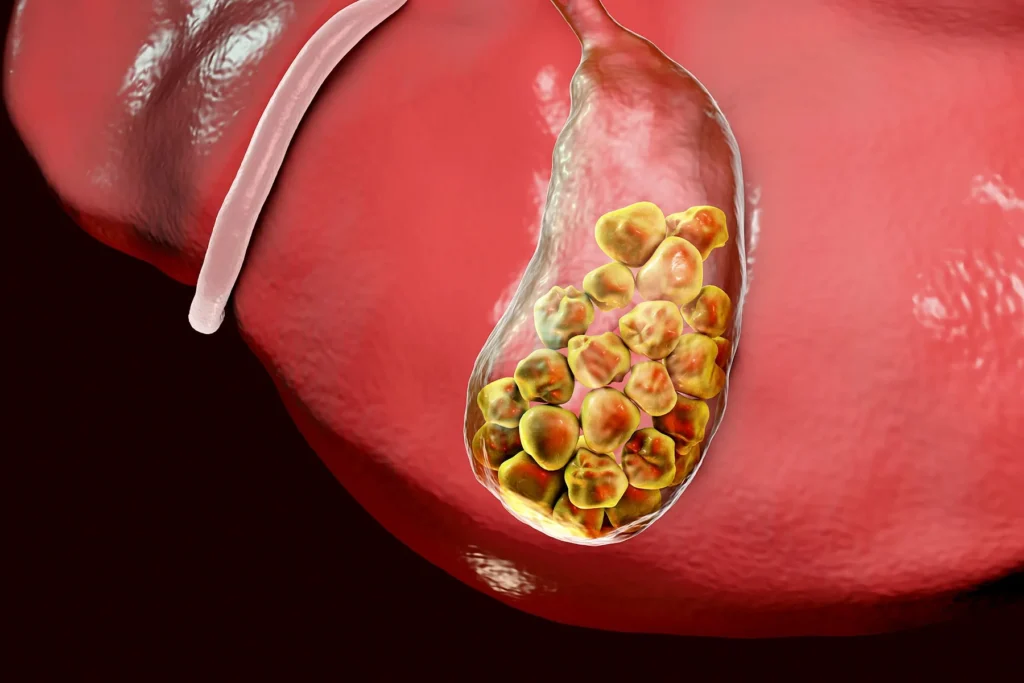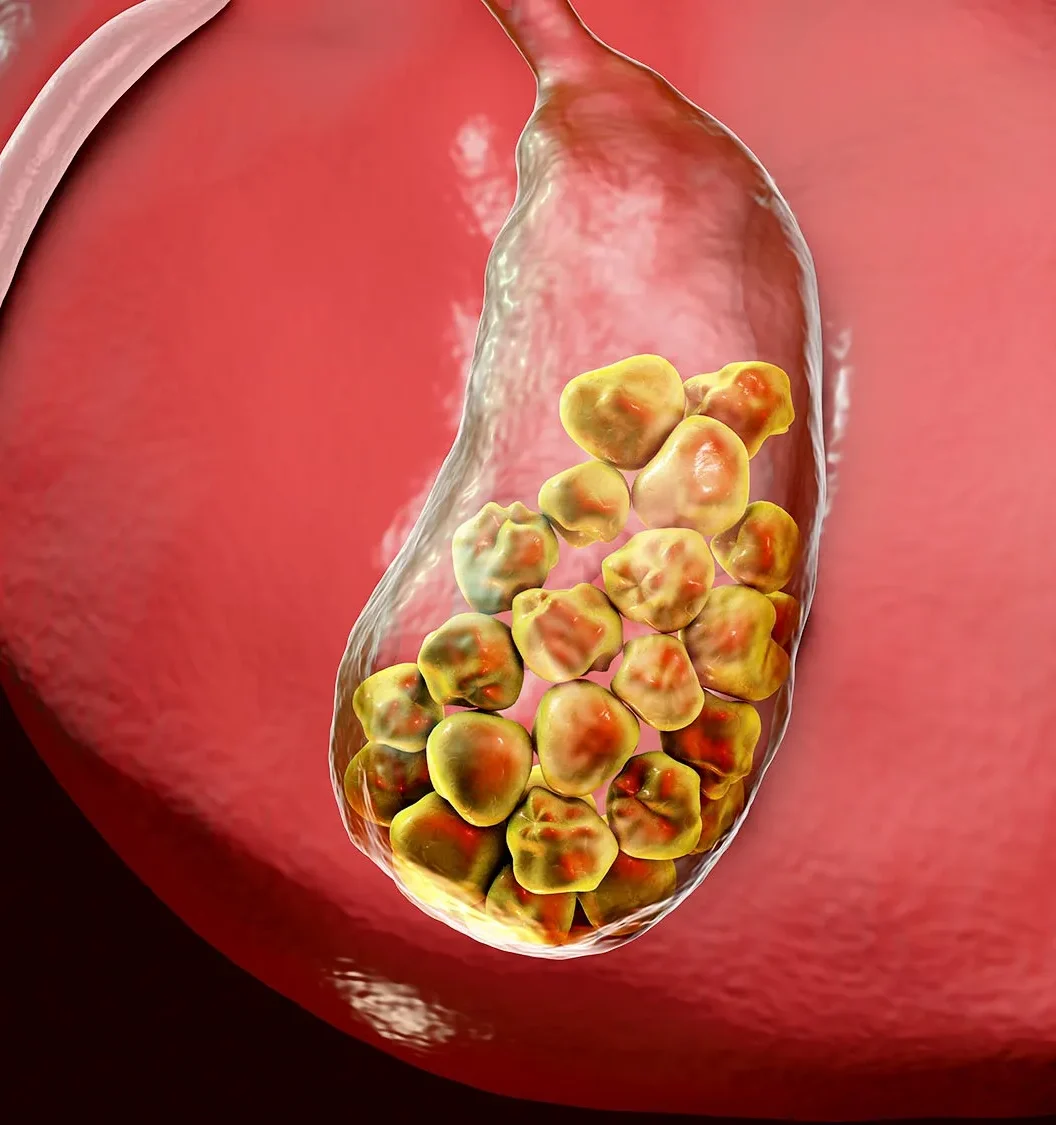Imagine carrying tiny, rock-like crystals inside your body without even knowing it. They sit quietly in your gallbladder – a small pouch under the liver – until one day, they strike with unbearable pain. This silent condition is known as gallstones, and for many, the first attack feels like being stabbed from the inside.
Gallstones are far more common than most people realise. According to medical reports, millions of people suffer from gallbladder stones every year, with women, people over 40, and those with unhealthy lifestyles at higher risk. But the real danger lies in the fact that gallstones often remain undetected until they trigger an emergency.
What Are Gallstones?
Gallstones are hardened deposits that form in the gallbladder from cholesterol, bile salts, or waste products. Their size can range from a grain of sand to a golf ball. While some gallstones cause no symptoms (called silent gallstones), others can block bile ducts and cause excruciating abdominal pain known as a gallbladder attack.

Symptoms of Gallstones You Should Never Ignore
The pain from gallstones is often described as sudden, sharp, and unbearable. Watch out for these warning signs:
- Intense pain in the upper right or middle abdomen (often after fatty meals)
- Pain that radiates to the back or right shoulder
- Nausea and vomiting
- Indigestion, bloating, or feeling unusually full
- Fever or yellowing of the skin/eyes (jaundice) – a red alert that requires urgent care
What Tests Are Required for Gallstones?
If you or your doctor suspects gallstones, diagnostic tests are the only way to confirm. Common investigations include:
- Ultrasound Test – The most common and painless test to detect gallstones. (Highly recommended if you have sudden abdominal pain.)
- Blood Tests – To check for infection, liver function, or signs of blocked bile ducts.
- CT Scan or MRI Scan – To spot complications or hidden gallstones.
- Endoscopic Ultrasound (EUS) – A more detailed test if regular scans don’t give a clear picture.
Tip: If you live in Delhi, Chandigarh, Panchkula, or Mohali, you can book quick appointments at trusted diagnostic labs for ultrasound or CT scans to confirm gallstones before they become an emergency.
Who Is at Risk of Gallstones?
Doctors often refer to the “4 F’s” when identifying who is more likely to develop gallstones:
- Female – Women are twice as likely as men.
- Forty – Risk increases with age.
- Fat – Being overweight is a major trigger.
- Fertile – Pregnancy hormones can contribute to gallstone formation.
Other risk factors include diabetes, rapid weight loss, high-fat diets, and family history.
Treatment Options for Gallstones
- Silent Gallstones – If they don’t cause symptoms, they may not need immediate treatment.
- Medications – Rarely used, as they are slow and not very effective.
- Surgery (Cholecystectomy) – The most common treatment, where the gallbladder is removed.
This is safe, effective, and usually done laparoscopically (keyhole surgery). - Endoscopic Procedures – To remove stones blocking the bile duct.
FAQs About Gallstones
1. Can gallstones go away on their own?
No, gallstones usually don’t disappear naturally. Small ones may move, but most remain until treated.
2. How are gallstones diagnosed quickly?
The fastest and most accurate test is an ultrasound scan, available at most diagnostic labs.
3. Do I always need surgery for gallstones?
Not always. If gallstones are silent, doctors may monitor them. But if symptoms are severe, surgery is usually the safest choice.
4. What foods should I avoid if I have gallstones?
Avoid fried foods, fatty meats, full-cream dairy, and high-cholesterol meals. A diet rich in fibre and low in fat is recommended.
5. Can gallstones be prevented?
Maintaining a healthy weight, eating a balanced diet, exercising, and staying hydrated can reduce your risk.
6. How painful is a gallstone attack?
Many describe it as one of the worst pains they’ve ever felt, often mistaken for a heart attack or ulcer.
Gallstones may seem small, but their impact can be life-shattering if ignored. From sudden abdominal pain to life-threatening infections, the risk is real. The good news? Early diagnosis through ultrasound, CT, or blood tests can save you from a medical emergency. If you’ve been experiencing unexplained abdominal pain, don’t wait – book your tests at a trusted diagnostic lab in Delhi, diagnostic labs in Chandigarh, diagnostic labs in Panchkula, or diagnostic labs in Mohali today.





